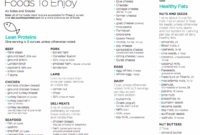South Beach Diet success stories illuminate the transformative power of mindful eating and lifestyle changes. This exploration delves into the experiences of individuals who have achieved remarkable weight loss and significant health improvements through the South Beach Diet, highlighting both their triumphs and challenges. We’ll examine the strategies they employed for long-term success, including dietary adjustments, lifestyle modifications, and the importance of personalized approaches. Discover how these individuals not only lost weight but also improved their overall well-being, gaining a renewed sense of energy and confidence.
From dramatic weight loss figures and improved health markers to the emotional journey of transformation, this comprehensive overview provides inspiration and practical insights for anyone considering the South Beach Diet or seeking to maintain their weight loss long-term. We’ll also address common questions and concerns, offering a balanced perspective on the diet’s effectiveness and its potential to become a sustainable lifestyle choice.
Dietary Adjustments and Personalization
The South Beach Diet, while structured, recognizes the diverse needs and preferences of its followers. Success on the diet often hinges on the ability to adapt its principles to individual circumstances, ensuring long-term adherence and sustainable weight management. Flexibility is key, allowing for personalization without compromising the core tenets of the program.
The beauty of the South Beach Diet lies in its adaptability. It’s not a rigid, one-size-fits-all approach. Instead, it provides a framework that can be tailored to accommodate various dietary needs and preferences, promoting a healthier relationship with food and long-term weight management. This allows for sustainable weight loss and improved overall health, rather than relying on restrictive, unsustainable methods.
Dietary Modifications for Allergies and Health Conditions
Many individuals have successfully adapted the South Beach Diet to manage allergies and health conditions. For example, someone with a gluten intolerance can easily substitute gluten-free bread and pasta options in their meals, ensuring they remain within the diet’s guidelines. Similarly, individuals with dairy allergies can utilize dairy-free alternatives like almond milk or soy milk in their recipes without significantly impacting the nutritional profile of their meals. Those with specific carbohydrate intolerances may need to carefully monitor their intake of certain fruits and vegetables, adjusting portion sizes accordingly. Consulting a registered dietitian or nutritionist is highly recommended for individuals with complex health conditions to ensure the diet aligns with their specific needs.
Common Dietary Modifications and Their Impact
Several common modifications are frequently employed by successful South Beach Dieters. Many reduce their intake of processed foods and added sugars, focusing instead on whole, unprocessed ingredients. This shift often leads to improved energy levels, better digestion, and a reduction in cravings. Others increase their intake of lean protein and healthy fats, supporting satiety and promoting muscle maintenance during weight loss. The incorporation of more vegetables and fiber also contributes to enhanced digestive health and improved nutrient absorption. These modifications, when implemented strategically, can significantly enhance the effectiveness of the diet and improve overall well-being.
Customization for Various Lifestyles: Vegetarian and Vegan Adaptations
The South Beach Diet can be effectively adapted to various lifestyles, including vegetarian and vegan diets. A vegetarian following the South Beach Diet might focus on lean protein sources like beans, lentils, tofu, and eggs, incorporating plenty of vegetables and healthy fats from sources like avocados and nuts. They would need to carefully plan their meals to ensure adequate protein intake. A vegan approach would necessitate a similar level of planning, focusing on plant-based protein sources such as legumes, tofu, tempeh, and seitan, alongside a variety of vegetables, fruits, and healthy fats. Both vegetarian and vegan adaptations require careful attention to nutrient intake to ensure they meet their daily requirements for essential vitamins and minerals. Many online resources and cookbooks offer South Beach Diet-compliant recipes tailored to these dietary lifestyles, demonstrating the versatility of the program.
Closure
Ultimately, the South Beach Diet success stories underscore the importance of a holistic approach to weight management. While the diet itself provides a structured framework, long-term success hinges on sustainable lifestyle changes, personalized adjustments, and unwavering commitment. The journeys shared here offer valuable lessons in perseverance, adaptability, and the profound impact of prioritizing health and well-being. By understanding the challenges and triumphs of others, individuals can embark on their own South Beach Diet journey with a greater sense of purpose and a clearer understanding of what it takes to achieve lasting results.




